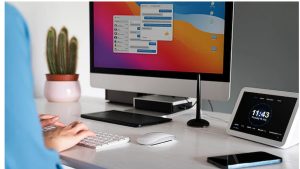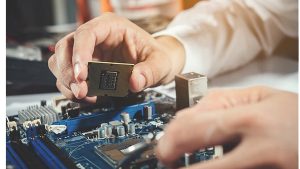Reasons A Desktop Is Better Than A Laptop: The advent of technology came with lots of advantages owing to it’s incorporation into different spheres of human endeavors and how it drastically improve them.
Often time, the computer is seen and identify as a simple electronic gadget performing specific class of functions however, studies shows that the kind of computer used affects your level of productivity. Many factors has lead to the search about which species of computer device is more efficient.
The Desktop computers and the Laptop computers has been subjected to such comparative analysis. In this article, we will be looking at some of the main difference and why the Desktop computers are much more better than the Laptop computers.
Recommended: Most Developed Countries in Africa
Top 10 Major Reasons Why A Desktop Is Better Than A Laptop
1. Capability: Desktop computers have more processing power than laptops, which is the most apparent advantage of purchasing a desktop. When every component has to fit into such a small device, there is a limit to what can be accomplished, despite the fact that laptops are getting more powerful all the time.

Only desktop computers provide performance that can compete with the best in the industry. If you want a laptop with specifications that are comparable to those of a desktop computer, you can anticipate paying a large premium for the same level of performance. It is important to note that the significance of power is highly dependent on the purposes for which you want to use a computer.
Desktop computers provide absolutely no advantages over laptops if all you want to do is surf the internet, view movies, and type documents.
2. Cost: The cost of a comparable desktop computer is much less than that of a comparable laptop computer. Desktops have lower prices.

The disparity is most striking when it comes to high-end computers, where the cost of an equivalent desktop computer might be easily less than that of an equivalent laptop computer.
This is something that should definitely be taken into consideration if you are attempting to save money, but it should also be something that you think about regardless of how much money you are spending.
If you are paying a much higher price for the same specifications, the money you save might easily be used toward purchasing components or peripherals that are more powerful.
See Also: Cheapest Places To Live in India
3. Upgradability: Laptops are incredibly useful when you want to transfer them from place to place, but upgrading a laptop is far more difficult than upgrading a desktop computer. Desktop computers are easier to update than laptops.

If you want to improve the performance of your desktop computer, all you have to do is open the case and install a new component. There are also PCs that are built in such a manner that there is already space accessible for you to use.
Everything inside of a laptop is jam-packed up against one another. Because of this, there will be considerable limitations placed on what you may improve. In addition to that, it makes the installation of anything difficult.
4. Repairs: When it comes to repairs, desktop computers are easier to work on than laptops, which may be difficult in and of themselves. When a certain component fails, it is necessary to replace that specific component as soon as possible.

This is something that requires just a basic understanding of technological concepts to do on a PC. When it comes to laptops, it might be difficult to open the device without causing any damage, and in many cases, specific components are unable to be changed.
Recommended: Most Beautiful Countries In The World
5. Desktops Can Be Left On for a longer period: One benefit of desktop computers that a lot of people don’t take into account is the fact that they may be kept on for an unlimited amount of time.
This is helpful for users who want their computer to function as a remote server or who want to execute applications throughout the night when the machine is less likely to be disturbed.
It is also possible to leave a laptop turned on forever; however, laptops were not designed for this purpose, and doing so runs the risk of causing hardware damage.
Must Read: Longest Books In The World
6. Difficult To Move Or Steal: Desktops Are Much More Difficult to Steal In contrast, laptops are convenient for moving from one location to another; yet, this portability also makes them appealing to thieves.

Desktop computers are sometimes cumbersome to transport, and as a result, thieving one requires a certain amount of commitment on the part of the perpetrator. When you take your laptop outdoors or use it in a public area, you put it at risk of being stolen.
This is also true when you take your laptop outside. It is important to note that you may buy locks to prevent laptop theft; however, it is important to keep in mind that many of these attachments do make the laptop less portable and convenient.
7. Desktops Produce Less Noise: Desktops differ greatly in terms of noise output. You shouldn’t have any trouble finding a desktop computer, though, if you’re looking for one that doesn’t make any noise at all, regardless of the software that’s installed on it.

This is due to the fact that a desktop computer has adequate room to accommodate the installation of as many fans as are required to maintain a cool environment without producing additional noise.
The dimensions of the fans that are placed in laptops are the primary criteria for selection. When running applications that are resource-intensive, this results in many laptops making a significant amount of noise.
8. Number Of Ports: Desktop Computers offer a Wider range of Ports Desktop computers offer a wider range of ports, which enables users to attach an unlimited number of peripheral devices.
In the event that a certain port is not accessible, it is feasible that one may be added. This degree of adaptability is not provided by laptop computers. There is a practical cap on the number of ports that can be fitted due to the limited amount of available space. And this may provide a challenge in the event that you choose to add other peripherals.
This degree of adaptability is not provided by laptop computers. There is a practical cap on the number of ports that can be fitted due to the limited amount of available space. And this may provide a challenge in the event that you choose to add other peripherals.
See Also: Easiest Sports In The World
9. Screen Size: Screens on desktop computers are typically much larger, whereas those found on laptops have seen substantial development in recent years.

These days, displays of 17 inches are very standard, and since they contain so many pixels, users are able to comfortably work with many tabs and applications open at the same time.
Despite the existence of this fact, desktop computers and laptops simply cannot be compared in terms of screen size. Screen sizes for desktop computers traditionally begin at 20 inches, although the vast majority of PCs today come outfitted with displays that are noticeably bigger.
Although it is possible to connect an external monitor to a laptop, doing so eliminates the portability that motivates many people to buy laptops in the first place.
10. Customization: Laptops that allow customers to customize their own hardware and software are now available in a dizzying array of combinations.

The majority of computer manufacturers provide a wide variety of choices for the computer’s CPU, random access memory (RAM), and hard disk. While doing so, you are still selecting items from a predetermined list that the manufacturer has provided to you. If you choose the route of a desktop computer, you can practically put together your own system.
This gives you access to a far larger selection of options and enables you to build a computer that is suited to your own requirements. This amount of customisation is not necessary for everyone, and some people may not even want it, but it is an option that is only available on desktop computers.
See Also: Advantages and Disadvantages of Online Shopping
Conclusion
Finally, whether desktops or laptops are better depends on your specific needs and priorities. If you need high performance, bigger displays, and superior ergonomics, a desktop computer may be a better option. If mobility, adaptability, and battery life are more essential to you, a laptop may be the better alternative.
It’s worth noting that, as technology advances, the gap between desktops and laptops is decreasing, and each provide distinct advantages that might suit various people. Finally, it’s critical to weigh the benefits and drawbacks of each option and select the one that best meets your specific needs.

Edeh Samuel Chukwuemeka, ACMC, is a lawyer and a certified mediator/conciliator in Nigeria. He is also a developer with knowledge in various programming languages. Samuel is determined to leverage his skills in technology, SEO, and legal practice to revolutionize the legal profession worldwide by creating web and mobile applications that simplify legal research. Sam is also passionate about educating and providing valuable information to people.
